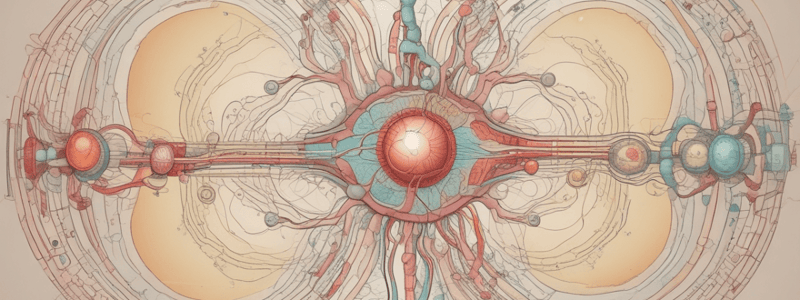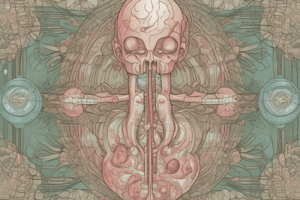Podcast
Questions and Answers
Which mechanism helps regulate hormone production through a negative feedback loop?
Which mechanism helps regulate hormone production through a negative feedback loop?
- Hormone receptors
- Negative feedback mechanism (correct)
- Hormone interactions
- Hormone stimulation
Which gland is often referred to as the 'master gland'?
Which gland is often referred to as the 'master gland'?
- Pancreas
- Pituitary gland (correct)
- Adrenal gland
- Thyroid gland
Which of the following methods measures hormone levels using radioactive isotopes?
Which of the following methods measures hormone levels using radioactive isotopes?
- ELISA
- RIA (correct)
- Chromatography
- Cell Culture
Which data analysis technique visualizes hormone data using graphs and charts?
Which data analysis technique visualizes hormone data using graphs and charts?
Which hormone regulates glucose metabolism?
Which hormone regulates glucose metabolism?
Which gland produces hormones that regulate reproductive functions?
Which gland produces hormones that regulate reproductive functions?
Which of the following is NOT a function of hormones?
Which of the following is NOT a function of hormones?
Which of the following is an example of hormone interaction?
Which of the following is an example of hormone interaction?
Flashcards are hidden until you start studying
Study Notes
Hormone Regulation
- Negative Feedback Mechanism: Hormones regulate their own production through negative feedback loops, where high levels of hormone inhibit further production.
- Hormone Receptors: Specific receptors on target cells bind to hormones, triggering a response.
- Hormone Interactions: Hormones can interact with each other to modulate their effects.
Endocrine Gland Function
- Pituitary Gland: The "master gland" regulates other endocrine glands and produces hormones that stimulate growth and development.
- Thyroid Gland: Produces thyroxine (T4) and triiodothyronine (T3) to regulate metabolism.
- Adrenal Glands: Produce catecholamines (e.g., adrenaline) to regulate stress response and cortisol to regulate glucose metabolism.
- Pancreas: Produces insulin and glucagon to regulate blood sugar levels.
- Gonads: Produce sex hormones (e.g., testosterone, estrogen) to regulate reproductive functions.
Hormone Research Methods
- Radioimmunoassay (RIA): Measures hormone levels using radioactive isotopes.
- Enzyme-Linked Immunosorbent Assay (ELISA): Measures hormone levels using antibodies and enzymes.
- Chromatography: Separates and identifies hormones based on their chemical properties.
- Cell Culture: Studies hormone effects on cells in a controlled laboratory setting.
Data Analysis Techniques
- Statistical Analysis: Uses statistical methods to analyze hormone data, such as t-tests and ANOVA.
- Graphical Analysis: Visualizes hormone data using graphs and charts to identify trends and patterns.
- Bioinformatic Analysis: Analyzes large datasets to identify hormone-related genes and pathways.
Endocrine Function
- Metabolic Regulation: Hormones regulate metabolic processes, such as glucose and lipid metabolism.
- Growth and Development: Hormones regulate growth and development, including puberty and bone growth.
- Stress Response: Hormones regulate the body's response to stress, including the "fight or flight" response.
- Reproductive Function: Hormones regulate reproductive functions, including fertility and menstruation.
- Electrolyte Balance: Hormones regulate electrolyte balance and blood pressure.
Hormone Regulation
- Hormones regulate their own production through negative feedback loops, where high levels of hormone inhibit further production, maintaining homeostasis.
- Specific receptors on target cells bind to hormones, triggering a response, ensuring accurate cellular communication.
- Hormones interact with each other to modulate their effects, creating complex physiological responses.
Endocrine Gland Function
- The pituitary gland, often referred to as the "master gland," regulates other endocrine glands and produces hormones that stimulate growth and development, such as growth hormone.
- The thyroid gland produces thyroxine (T4) and triiodothyronine (T3), which regulate metabolism, influencing energy production and utilization.
- The adrenal glands produce catecholamines (e.g., adrenaline) to regulate stress response and cortisol to regulate glucose metabolism, ensuring a rapid response to stress.
- The pancreas produces insulin and glucagon, hormones that regulate blood sugar levels, maintaining glucose homeostasis.
- The gonads produce sex hormones (e.g., testosterone, estrogen) to regulate reproductive functions, such as puberty and fertility.
Hormone Research Methods
- Radioimmunoassay (RIA) measures hormone levels using radioactive isotopes, allowing for sensitive and specific hormone detection.
- Enzyme-Linked Immunosorbent Assay (ELISA) measures hormone levels using antibodies and enzymes, providing a highly sensitive and specific assay.
- Chromatography separates and identifies hormones based on their chemical properties, enabling the purification and analysis of hormones.
- Cell culture studies hormone effects on cells in a controlled laboratory setting, facilitating the understanding of hormone-cell interactions.
Data Analysis Techniques
- Statistical analysis uses statistical methods to analyze hormone data, such as t-tests and ANOVA, enabling the identification of significant trends and patterns.
- Graphical analysis visualizes hormone data using graphs and charts, facilitating the identification of trends and patterns.
- Bioinformatic analysis analyzes large datasets to identify hormone-related genes and pathways, providing insights into hormone regulation and function.
Endocrine Function
- Hormones regulate metabolic processes, such as glucose and lipid metabolism, influencing energy production and utilization.
- Hormones regulate growth and development, including puberty and bone growth, ensuring proper tissue and organ maturation.
- Hormones regulate the body's response to stress, including the "fight or flight" response, enabling the body to adapt to changing environments.
- Hormones regulate reproductive functions, including fertility and menstruation, ensuring proper reproductive health.
- Hormones regulate electrolyte balance and blood pressure, maintaining homeostasis and overall health.
Studying That Suits You
Use AI to generate personalized quizzes and flashcards to suit your learning preferences.



